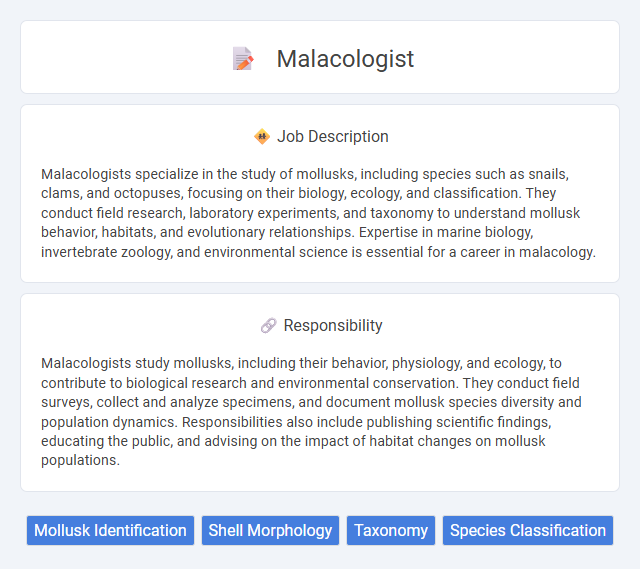
Malacologists specialize in the study of mollusks, including species such as snails, clams, and octopuses, focusing on their biology, ecology, and classification. They conduct field research, laboratory experiments, and taxonomy to understand mollusk behavior, habitats, and evolutionary relationships. Expertise in marine biology, invertebrate zoology, and environmental science is essential for a career in malacology.
Individuals with a strong interest in marine biology and attention to detail will likely find a career as a malacologist suitable. Those who enjoy research and fieldwork may experience higher job satisfaction in this role. People with physical stamina for outdoor conditions and a methodical mindset might be more inclined to excel in studying mollusks.
Qualification
Malacologists typically require a bachelor's degree in biology, zoology, or environmental science, with advanced roles often demanding a master's or Ph.D. specializing in malacology or related marine sciences. Proficiency in taxonomy, ecology, and molecular biology techniques is essential, alongside fieldwork experience in mollusk habitats. Strong analytical skills and familiarity with Geographic Information Systems (GIS) enhance research capabilities in studying mollusk species and their ecosystems.
Responsibility
Malacologists study mollusks, including their behavior, physiology, and ecology, to contribute to biological research and environmental conservation. They conduct field surveys, collect and analyze specimens, and document mollusk species diversity and population dynamics. Responsibilities also include publishing scientific findings, educating the public, and advising on the impact of habitat changes on mollusk populations.
Benefit
A career as a malacologist likely offers the benefit of contributing to biodiversity conservation through the study of mollusks and their habitats. Salary prospects may vary but could include opportunities in academia, research institutions, and environmental organizations. Job satisfaction probably stems from advancing scientific knowledge and supporting ecological sustainability initiatives.
Challenge
Malacologists likely face the challenge of studying diverse mollusk species in varying and often remote habitats, which can complicate data collection and fieldwork. The complexity of mollusk biology and taxonomy may require advanced analytical skills and attention to detail to accurately classify and understand these organisms. Research funding and limited public awareness about mollusks might also pose obstacles to career advancement and project implementation.
Career Advancement
Malacologists specializing in the study of mollusks can advance their careers by pursuing research positions in academic institutions or government agencies focused on marine biology and environmental science. Gaining expertise in molecular techniques and ecological modeling enhances opportunities for leading conservation projects and securing competitive research grants. Progression often involves transitioning from field research roles to senior scientist or professorship positions, contributing to authoritative publications and collaborating on international biodiversity initiatives.
Key Terms
Mollusk Identification
Malacologists specialize in the study and classification of mollusks, including octopuses, clams, and snails, by analyzing their physical characteristics and genetic data. Accurate mollusk identification is crucial for biodiversity assessments, environmental monitoring, and conservation efforts. Expertise in taxonomy, microscopy, and molecular techniques enables malacologists to distinguish species and understand their ecological roles.
Shell Morphology
Malacologists specializing in shell morphology study the structure, patterns, and variations of mollusk shells to understand species identification, evolutionary relationships, and environmental adaptations. They analyze shell composition, growth patterns, and coloration using microscopy and imaging techniques to assess biodiversity and paleontological records. Expertise in shell morphology aids in conservation efforts and the management of marine ecosystems by monitoring mollusk populations and their habitats.
Taxonomy
Malacologists specialize in the taxonomy of mollusks, classifying species based on morphological and genetic characteristics to understand evolutionary relationships. They conduct field research and laboratory analyses to identify new species, maintain comprehensive specimen collections, and update taxonomic databases. Expertise in taxonomy aids biodiversity conservation and supports ecological studies involving mollusk populations.
Species Classification
Malacologists specialize in the classification and identification of mollusk species, using morphological and genetic analysis to differentiate between them. Their work involves cataloging species, studying evolutionary relationships, and updating taxonomic databases to reflect new scientific discoveries. Accurate species classification aids in biodiversity conservation and ecological research within marine and terrestrial ecosystems.
 kuljobs.com
kuljobs.com